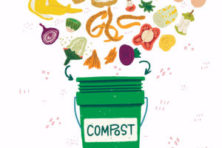Egg Harbor Expands Composting Effort Beyond Its Borders
- Share
- Tweet
- Pin
- Share

$84,000 USDA grant will go to equipment, education
The Village of Egg Harbor will give northern Door County composting a boost and reduce landfill waste this spring.
The village, a Green Tier Legacy Community since 2017, received an $84,245 grant from the U.S. Department of Agriculture to use toward a $112,300 two-year effort that reaches beyond the village limits.
The village-led program, in collaboration with the Door County Climate Change Coalition (CCC), includes the provision of free five-gallon buckets for non-meat food scraps to residents, with some some buckets available for purchase by donations to the Door Community Compost Initiative.
Improvements include new signage to prevent contamination when residents do self-serve drop-off, a new concrete pad for the compost pile and the purchase of a truck with a liftgate at the village site.
Collections will be increased from local restaurants, and farm markets throughout northern Door County will be encouraged to drop off compostable materials at a centrally-located bin at the Jacksonport Farmers Market starting in spring.
Going Garbage will handle the pickup from the Jacksonport site and continue its scheduled collection at Gibraltar school.
“The grant program is opening the door to food-waste diversion as long as the contamination is controlled,” said Jeff Johnson, Going Garbage owner. “Participants [food preparers, bucket dumpers, vehicle drivers, pile managers, and farmers] are now in a local supply chain to manufacture a wonderful, carbon-sequestering product and significantly reduce the carbon emission footprint of the 200-mile round trip to the landfill for what was formerly waste.”
Egg Harbor employees at the compost site turn the compost and add yard-waste materials to help heat up and speed up the composting process. Jess Reinke, Green Tier coordinator and one of the Door Community Compost Initiative leaders, said more participants adding more green material means more natural heating within the compost pile. The goal is to have the compost reach high enough temperatures to kill the cocoons of nonnative jumping worms that caused the village to slow the expansion of the program last summer. This will allow the village to use compost in flower beds, provide free mulch to village residents and eventually sell compost to recoup program costs.
The project, funded mostly by the two-year renewable grant, builds on the village’s existing program while also raising awareness, and promoting a sustainable model for other communities.
“We are very excited to advance our existing compost program with the
assistance of this funding opportunity via site improvements and increased community participation within the Village and throughout the county,” said Megan Sawyer, Village Administrator.
Collaborations will extend to Destination Door County to get tourists involved in composting, and the Gibraltar schools’ Ecology Club is committed to involvement.
“The composting pickup opportunity for Gibraltar has helped us improve the food waste problem that the group identified as a major concern,” said Mary Kate McCormack, head of the Gibraltar
Ecology Club. “We feel happy that all the produce is not going to a landfill.”
The CCC plans further collaborations with farms and municipalities to establish additional compost drop-off points.



